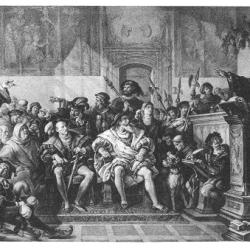
We converts to Catholicism are often told that we didn’t understand Protestantism before we left it (and that was, of course, supposedly why we left — we were dupes of Rome and her nefarious, deceitful apologists because we were so stupid in the first place). In most conversion stories to Catholicism that I have seen, this isn’t the case at all.
In fact, the exact opposite is usually true: it was the commitment to Protestant Christianity and all that is good in it which made these inquirers study and ponder a further move into Catholicism, with its sacramentalism, Mariology, tradition, papacy, etc.
We saw (I certainly saw) the move as a simple progression upwards; not a reversal or revolution or rejection of what we had already learned. We were committed Protestants, “good” Protestants; who really believed in the system and tried to live it out.
In any event, the argument is made that we converted because we were either ignorant, or non-observant, already-compromised Protestants. We were never really part of the club: we had the smells and bells and attraction to mysticism and the goddess-Mary and a perverse desire to give up our mind and submit to every jot and tittle of the pope’s utterances (including when we should blow our nose and what color socks to wear in the morning) in our warped souls, and so were easy-pickin’s for Rome.
I exaggerate, of course, but to read some cynical observations of Catholic converts, they aren’t all that different from this scenario.
This is — for the most part — all a bunch of nonsense, of course (as those of us who are converts are well aware). But how often and how much do we hear about similarly ignorant converts from Catholicism to Protestantism? Did they really know their faith before they left it? Were they dupes of the anti-Catholic Protestant apologists and sophists?
Or did they have an inexorable, irresistible attraction for private judgment and sola Scriptura in their souls from the beginning, and an irrational longing for whitewashed walls and plain clapboard churches and 90-minute hellfire-and-brimstone sermons and altar calls with the sinner’s prayer and the King James Version or interminable pentecostal worship sessions where the people say “Praise God” and “Hallelujah” and “Thank you Jesus” 742 times without engaging in “vain repetition” and the same person goes up front to get “saved” (which is supposed to be a one-time thing) for the sixth time in seven weeks? See how silly the rhetoric sounds if we turn the tables?
If we can cast doubt on Catholic converts due to alleged ignorance and compromise in their former faith-lives, why not apply the same standard to Protestant converts? Yes, why not? But, as I have shown over and over, anti-Catholics are nothing if not admirers of double standards.
Now, I do wish to note that the Catholic Church bears a great deal of blame insofar as atrocious, abominable catechesis has been scandalously widespread for well over a generation now. Liberalism and many other cultural and sociological factors have made ignorance and nominalism almost the norm.
Yet the individual remains responsible for his own soul, too (Catholics are not just a bunch of mindless clones: we must learn on our own also). A proper understanding of Catholicism is no further away than a couple of books (or even several solid, “meaty” articles): either apologetics or catechetical material. Now with the Internet it is even easier to learn. Within a solid week of study, anyone could have a working knowledge of what they are required to believe as a Catholic, and why they should believe it.
And this is why I do what I do and am so passionately committed to it. The more educated Catholics are, the more likely they will remain Catholics, and confident, spiritually thriving ones. The less-educated they are, the more likely they will leave the faith.
***
Dr. Mark Noll (of the Evangelical Presbyterian Church) has been on the Wheaton College faculty since 1979 and is the co-founder and present director of the Institute for the Study of American Evangelicals at Wheaton College. In recent years Dr. Noll has been a visiting teacher at Harvard Divinity School, University of Chicago Divinity School, Westminster Theological Seminary, and Regent College of Vancouver, B.C. He co-authored with Carolyn Nystrom, titled “Is The Reformation Over? An Evangelical Assessment of Contemporary Roman Catholicism” (Baker Academic, 2005).
In an interview on the Ignatius Insight web page, Dr. Noll stated:
Most of the ex-Catholics I know or know about tend to be pretty severe on their Catholic past. Most ex-Catholic evangelicals of my acquaintance were not well catechized, and often their Catholic experience was nominal, mechanical, or (in some instances) abusive; by contrast, many ex-evangelical Catholics reasoned themselves into Catholicism from articulate evangelical positions. That difference helps explain the contrast in “ex”s (if, in fact, my experience speaks to a general situation).
***
Some Protestants argue that Catholic converts are sick of the fighting and divisions in Protestant circles and so they split and cross the Tiber. No doubt they are tired of the fighting and little “pastor-doms” (we had our share of what I disdainfully called “civil wars” in Arminian, non-denom circles, too).
But they fail to go to the next step: maybe, perhaps (some small shred of possibility) people instinctively realize that division and bickering and proliferating denominations were not how God intended Christianity to be, and that there is something inherent in Protestantism (in its structure and belief-system) which produces this division that is demonstrably unbiblical and sinful (most Protestants freely admit that all the division is sinful, but they don’t seem to have a clue as to what to do about it).
In other words, maybe those of us who have converted figured out that the Protestant system had something wrong with it, which in turn produced the division that most Protestants excoriate. That would mean that conversion was motivated not by purely personal interests and comfort zones and touchy-feely stuff, but by the principle of considering that Protestant ecclesiology and rule of faith are fundamentally flawed, and thus no longer worthy of allegiance. Just a thought . . .
(originally 3-6-04, 3-30-04, and 9-26-05)
Photo credit: Fork in the road on Roughdown Common, Boxmoor, UK. © Copyright Graham Hale and licensed for reuse under this Creative Commons Licence.
***













